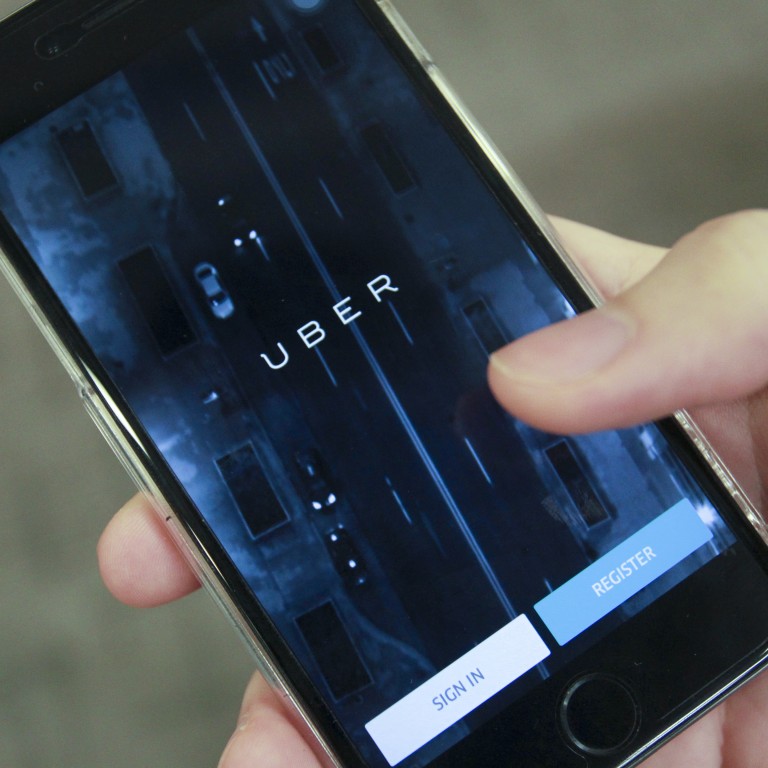
Uber faces losing battle against key Hong Kong transport constituency
To bring HK into a new era of efficient taxi services would involve the loss of HK$127 billion in investment and that is just not going to happen
Sorry, Sam, but it ain't quite so. I like the way you've learned to press the right buzzword buttons for our bureaucrats - all that talk of "expanding economic opportunities" and "technology and innovation" - but you're missing one thing.
What you're missing is HK$127 billion.
That's about how much the present owners of 18,138 taxi licences would stand to lose if we brought Hong Kong into the 21st century world of efficient taxi services, Uber style.
Each taxi licence is at present valued on the open market at about HK$7 million. The car itself, the standard Toyota Crown Comfort taxi, costs only about HK$230,000 and the licence owner brings nothing more to the business for the extra HK$6,770,000. It is straight speculation.
But these taxi owners control 35 of 208 votes for the transport functional constituency seat in the Legislative Council, the largest single voting bloc in that constituency, and the government considers the seat an essential safe patriot vote in Legco. This vote will not be endangered.
Our government would in any case never do something like wipe out HK$127 billion of investment value with an edict that changes the way the industry is structured.
It would lead to screaming protests in Beijing and possible violence in the streets. The decision would be reversed very quickly.
But there is no getting around it. If we allow Uber to come fully into the market with its technologically sophisticated service and as many cars as can find customers then the business of our existing taxi fleet will shrink and HK$127 billion of speculative investment will be crunched to a much smaller figure or wiped out entirely.
Look at it another way. At existing taxi fares, existing taxi demand and a fixed 18,138 registered taxis, your average taxi driver should be able to make at least HK$20,000 a month.
But this is much more than anyone of an average taxi's driver's education and social circumstances would normally earn. The figure for a person of this nature is more like HK$10,000 a month.
An unofficial market thus intervenes to reduce this income from HK$20,000 to HK$10,000 a month. It does this by separating taxi ownership from taxi operation and then charging the taxi driver about HK$400 a shift for the rental of his car.
What we have as a result is a financial asset, an income stream of HK$800 a day (two shifts at HK$400). The financial market quickly sets a capital value on this income stream.
It is what all financial markets do and, as a general rule, the capital value moves in the opposite direction of financial asset yields.
In other words, if interest rates go down then the capital value of the income stream goes up, which is what has happened with our taxi licences and why they are now valued at about HK$7 million apiece.
It means that about half of what you pay for a taxi ride goes to the licence owner of the taxi. He does nothing for this payment, nothing at all. He is just a speculator.
It does no good in such a system to raise taxi fares so that taxi drivers can have a higher income.
This might last for a month or two and then the licence owner will just raise his daily rental charge again and all the extra money will go to the owner rather than the driver.
It will happen that way because the number of taxis on the road has been capped at 18,138 for more than 20 years, which gives the licence owners absolute control of the financial side of the business.
Any true market-based taxi service could undermine this artificial structure, leave alone one that consumers also like because it is clean, fast and reliable with courteous drivers, like the Uber service.
But it would mean wiping out HK$127 billion in speculative investment held by a key constituency on the government's side and it just will not happen.
You stand at odds here with our government, Mr Gellman. Don't fool yourself.

